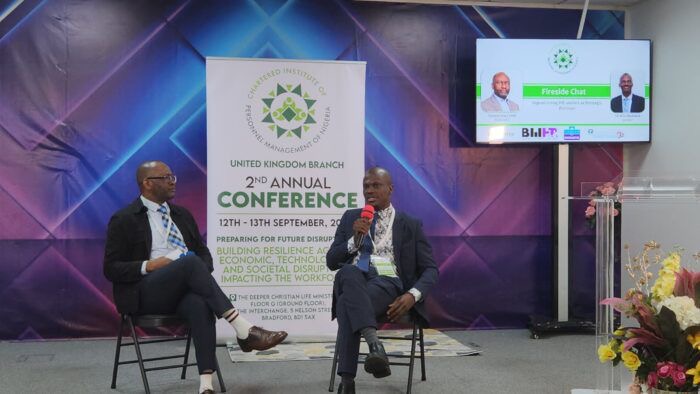Efficiency: CIPM UK calls for review of HR practice
Human Resources must evolve from policy custodian to allocator of options and bastions of positioning if organisations are to withstand climate shocks, geopolitical risk and technology upheaval, Dr Alim Abubakre told delegates at the CIPM UK Confab in Bradford.
In a statement by Mr Tominiyi Oni, former Group HR Director at TGI, Abubakre, Senior Lecturer in International Business at Sheffield Business School and Founder of TEXEM UK, said that corporate strategy is “a resource- allocation machineˮ, and that people are the only resource that compounds.
“Boards still treat HR as peripheral. Thatʼs why nearly a third of FTSE 100 CEOs come from finance while HR rarely makes the CEO pipeline,ˮ he said.
“Nigeria teaches speed under uncertainty; the UK teaches discipline under scrutiny. The opportunity is for HR to become architect of capability allocation, directing talent into the arenas where firms can compete and win.ˮ
Abubakre, a board member of Business Council for Africa, called for a decisive mindset shift.
“Stop asking for a seat at the table. Bring the map that shows where capabilities must go for strategy to live.
”Strategy is choice and trade-off; HR is the force that makes those choices executable—staffing risk and compliance ahead of market entry, wiring culture to sustain M&A. Optionality is the real currency of corporate survival.ˮ
Defining a strategic HR leader, he described “a portfolio leader of capabilitiesˮ who knows the few roles that create most value: “Identify the 20 roles that drive 70% of the plan, then move leadership, learning and incentives there.
”When a UK corporate makes a net-zero bet, HR should reallocate managers and rewards into low-carbon lines before the revenue shows up. That is strategy-grade HR.ˮ
Citing Microsoftʼs pivot to cloud and AI, he noted that Satya Nadellaʼs vision “would have died in PowerPoint if CHRO Kathleen Hogan hadnʼt operationalised culture as capital—rewiring systems, leadership standards and incentives around the cloud investment. That wasnʼt HR policy; it was corporate strategy in action.ˮ
On the biggest blocker, Abubakre pointed to perception: “Boards default to finance because CFOs bring costed, staged plans; HR is pigeonholed as policy.
”In Nigeria, informality hoards stars; in the UK, over-proceduralisation cages them—both kill reallocation.ˮ
He suggested HR to run quarterly talent-to-value reviews of the critical roles, enforce two-week redeployment SLAs, and bonus managers for enabling moves, not guarding fiefdoms.
Abubakre also urged rising HR leaders to build four muscles; corporate finance fluency, competence in reshaping business model, dexterity in intelligence gathering, geopolitical literacy, and decision-rights design.
“Read a P&L like a novel; map scenarios for FX shocks, sanctions and supply-chain risk; design who has the ‘Dʼ so choices donʼt die in committee. Nigeria sharpens courage; the UK sharpens evidence. Blend both—and you have a strategist.ˮ
He similarly urged CEOs to make HR a co-owner of capital allocation. by tieing funding for every strategic bet to a named capability plan through giving critical roles, leadership slates, culture shifts.
”Boards trust CFOs because their plans are costed. Demand the same from HR. No people plan, no capital.ˮ
Abubakre, however, said HR must sometimes slow strategy down.
“Speed without capability is expensive theatre. Uberʼs 2017 culture scandal—mishandled harassment complaints—cost a CEO, delayed IPO credibility, diminished brand equity and burned billions. Sometimes the bravest thing HR can say is: ‘We cannot win there—yet.ʼˮ
“Capital follows conviction, but advantage follows capability. Strategy without HR is just a budget; strategy with HR is an investment optimises the prospect of exponential return on investment.ˮ
“Nigeria teaches courage; the UK teaches cadence. Marry both, and HR stops being a function—it becomes the firmʼs strategic allocator of options.ˮ(NAN)(www.nannews.ng)
Edited by Ismail Abdulaziz









